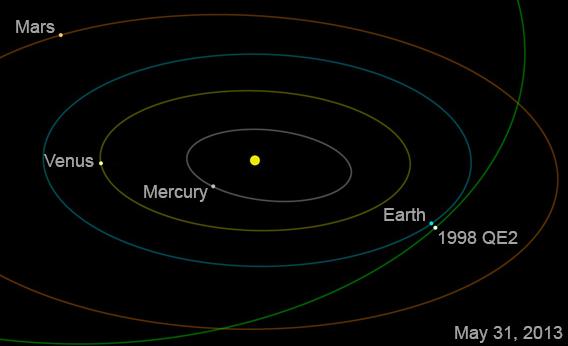Create a free profile to get unlimited access to exclusive videos, sweepstakes, and more!
Asteroid 1998 QE2 to Safely Pass Earth Tomorrow

On Friday, May 31, 2013 at 20:59 UTC (4:59 p.m. EDT), the asteroid 1998 QE2 will make its closest approach to Earth. Not that itâs all that close: It will miss us by six million kilometers (3.6 million miles), or 15 times the distance to the Moon. Thatâs good, because the asteroid is 2.7 kilometers (1.7 miles) across.
To be clear, we're safe from this particular asteroid; this pass is only close in an astronomical sense. Itâs still so far that youâll need a decent telescope just to see it at all (itâll get to a brightness of about magnitude 10âthe faintest star you can see with the naked eye is 50 times brighter), and this is the closest itâll get to us for literally hundreds of years.
Still, itâs a big rock and close enough that astronomers are taking note. Itâs a prime target for radar observations, and the Goldstone observatory will be pinging it during the pass. Those observations should resolve surface features on QE2 just a few meters across. NASAâs JPL put together a short video about all this:
As with any near pass of an asteroid, conspiracy theories abound. Forgive me if I donât give them any air by linking to them, but I've seen these claims come and go a dozen times in the past. Silliness like NASA is hiding evidence the asteroid will hit us; the asteroid will connect with the Earth electromagnetically and cause storms, and so on ad nauseum. The only things these breathless (and baseless) claims have in common is that they are always wrong, yet they always pop up again the next time an asteroid comes within a few million klicks of us. Either conspiracy theorists have a short memory, or their audience does.
I have to admit, this kind of nonsense is cramping my sense of humor. Given the asteroidâs designation and size, I really want to say itâs titanic. But Iâll refrain.
Anyway, NASA has a bunch of talks, interviews, and other activities about the asteroid planned for today and tomorrow. Instead of getting worked up over nonsense, hereâs a chance to learn about the reality of asteroids, what we can discover about them, and what role they play in the understanding of our solar system. I bet youâll find, as always, that reality is far, far more amazing than fantasy.


























